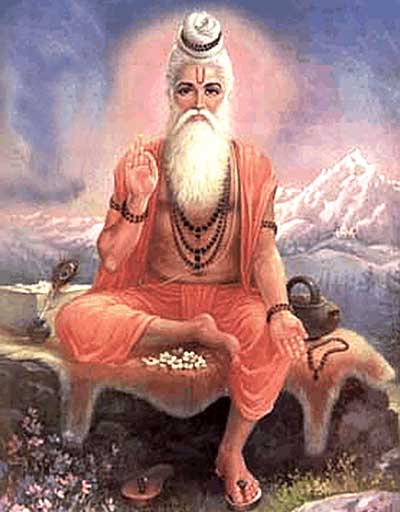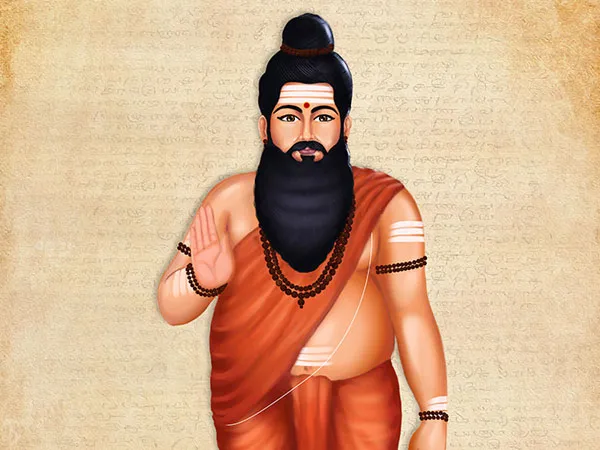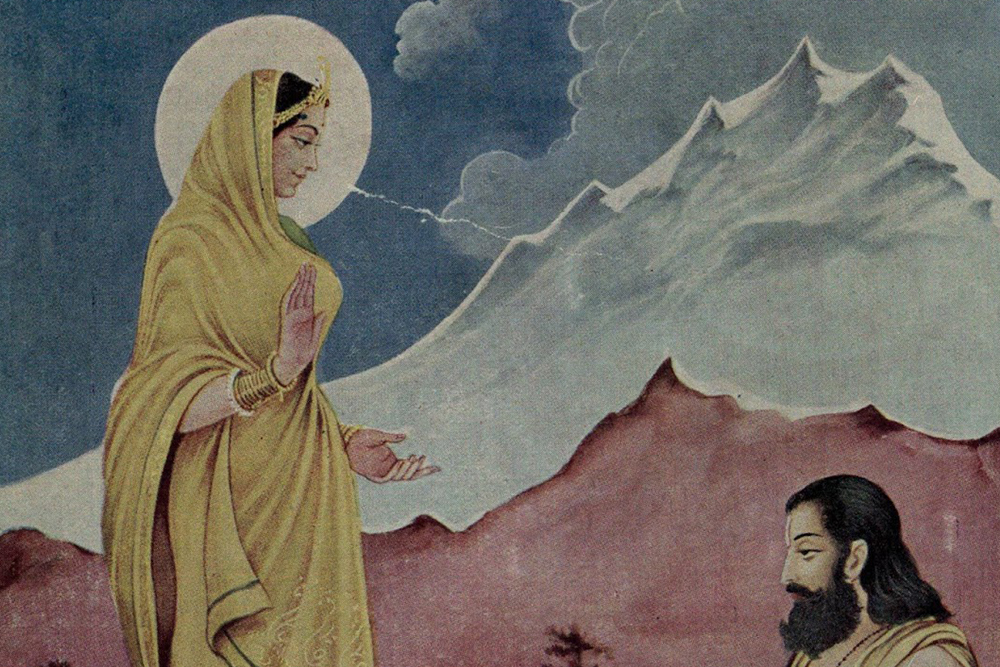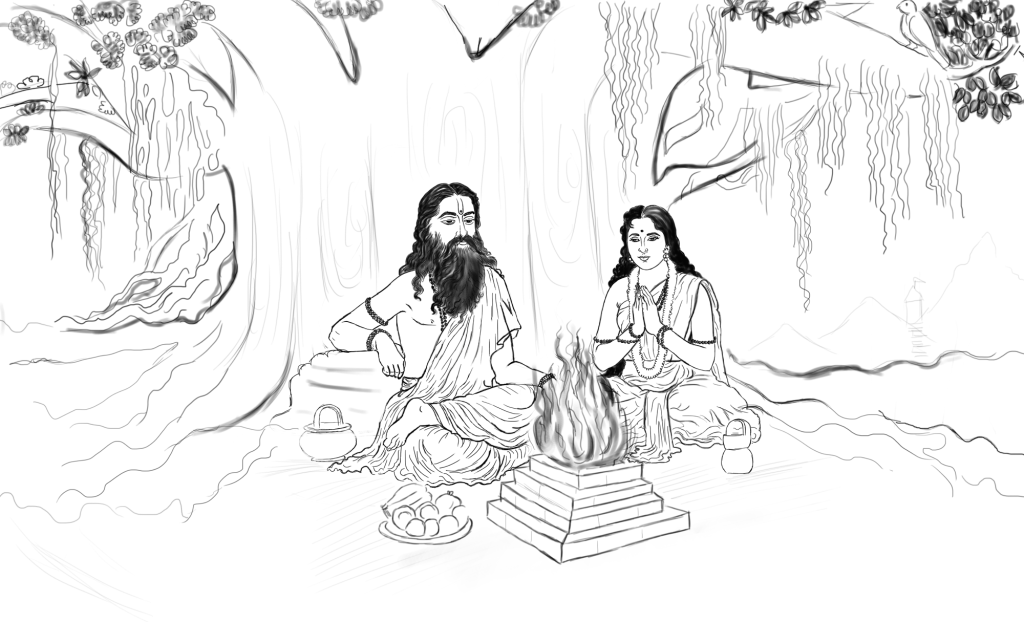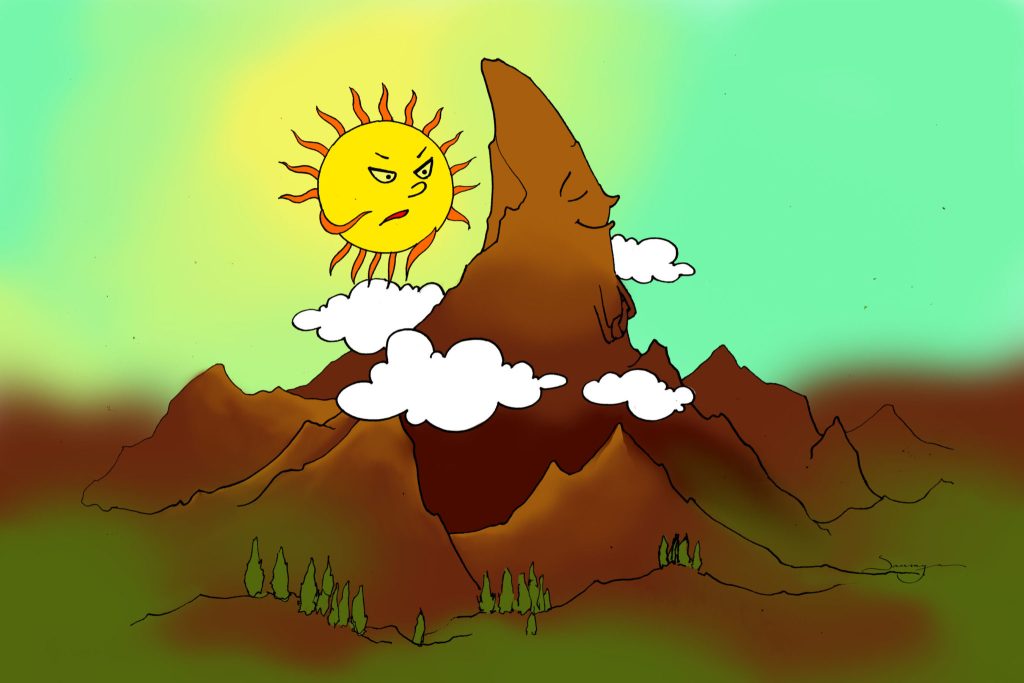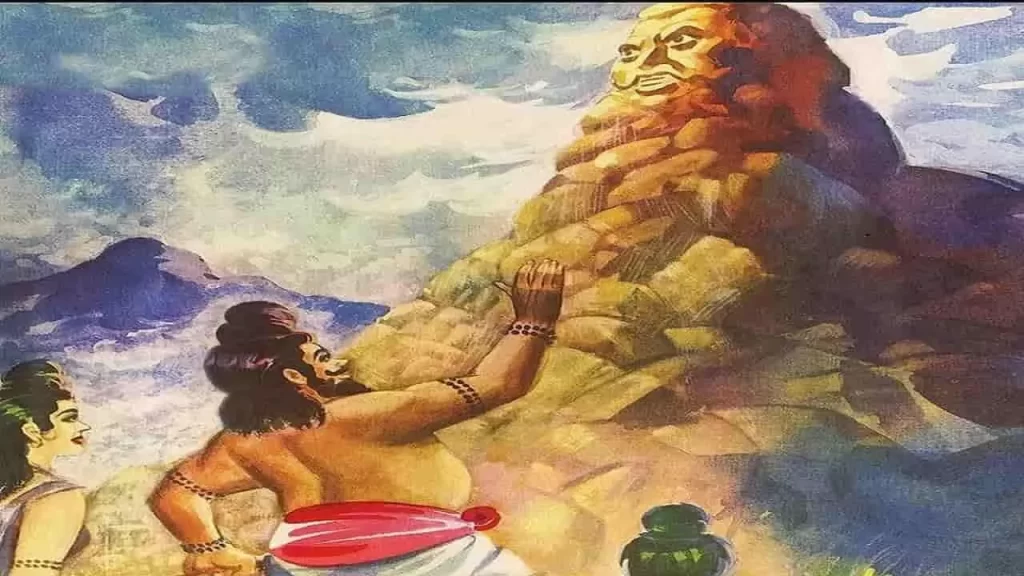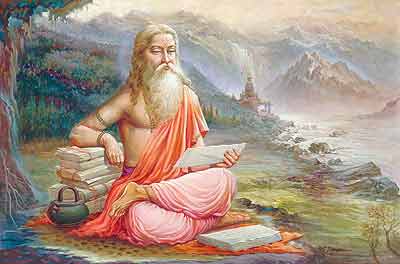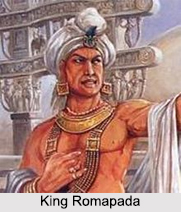By Nirooshitha Sethuram, Yogaratna
Graphics by Sheralee (Shambhavi) Hancherow
Yudishthira was inspired by the story of Nala and Damayanti. Hearing the story from Sage Brihadvasa encouraged him to be more content and present with the situation, while he was preparing for the future.
It had been five long years since Arjuna left them. As they hadn’t heard about Arjuna for a very long time, again the Pandavas started to worry about him.
During this time Sage Lomasha visited them. Through his divine vision he was able to know about Arjuna’s wellbeing and comforted Pandavas.
Sage Lomasha advised the Pandavas to go on a pilgrimage. Yudhishthira humbly requested the sage to join and guide them. The sage happily agreed and escorted them to numerous holy places. The sage recited many stories to the Pandavas, teaching them to be courageous and to be patient. The Pandavas heard stories about sages, kings and demons. Here are some of those stories the Sage shared with them.
The first and foremost story was about Agastya Muni, who is one of the seven most revered rishis in the Vedic texts. Once Agastya witnessed some souls hanging upside down, being in pain. Startled by this sight, Agastya asked them who they were and the reason for their severe austerities.
The souls answered, saying they were souls of his ancestors. The reason they were in that state was because of Agastya himself. They explained that Agastya, by being celibate, therefore hadn’t produced any children to do the rituals for the deceased forefathers. They also said if Agastya would marry and have children then, not only them, but he himself would be set free from life and death. So, Agastya decided to marry to gain salvation for his ancestors.
The king of Vidarbha came seeking Agastya’s blessings to have a child. The sage said that the king would be blessed with a beautiful daughter but with the condition that, when she comes of age, the marriage should be with him and no one else. The king was delighted to receive this blessing, as at that time he was desperate to have a child.
The king had a beautiful daughter as the sage promised and named her Lopamudra. The king’s daughter grew up to be a beautiful maiden. Even though her beauty was known to all, none came to marry her as they were afraid of Agastya muni.
Agastya visited the kingdom of Vidharpa to claim his bride. The king was not at all ready to give his daughter away to an ascetic. He loved her so much and was worried that she would not be able to survive living in the forest. But remembering his promise to the sage, he was afraid to break it so he was forced to full fill it.
Seeing her parents in distress and understanding their dilemma, Lopamudra also consoled them and persuaded them to give her to the sage. Hearing this from his beloved daughter was such a comfort to the king. The marriage happened according to the Vedic rituals.
As they were about to leave the palace, Agastya asked his wife to give away all her royal attires and jewelry, so she could wear clothes suiting an ascetic. Having been brought up as a woman of high virtue and piousness, Lopamudra happily accepted his words without hesitation. She went to live with him in the forest in ascetic clothes. She devoted herself in his service and served him very well, winning his heart. They both did severe penance and performed a great deal of austerities.
One day Agastya thought that the time has come to bear a son, as he promised to his ancestral sprits. He approached his wife lovingly and shared his desire. Lopamudra, with due respect, spoke sweetly and said she would very much like for Agastya to first fulfill her wish. Her wish was for the sage to provide her with comforts similar to the ways she was raised by her parents. At first Agastya told her that such a lifestyle would incur expenses. With him being a sage, he could not afford to provide such a life, as this wish demanded that Agastya to earn the needed wealth.
She reminded Agastya that he could certainly make all this happen by his spiritual powers. But Agastya didn’t want to diminish his state for material gains. Falling for her beauty and well-mannered nature, Agastya decided to seek help from nearby kings to fulfill her wishes.
To the first king he visited, Agastya said that he would like some donation from the king without the citizens of the country being affected by it. The king then produced the income and expenditure records which showed that nothing could be spared to fulfill Agastya’s need. This was the case with many other kings.
Agastya began to look around for a way to earn some income. When he couldn’t find any source of income, this led him to get the wealth from a demon named Ilvala.
Ilvala and his brother Vatapi despised brahmins so much that they wanted to kill them all. Bringing the dead from Yama Loka (hell) was a boon Ilvala had been blessed with in the past. So, Ilvala would invite a brahmin for dinner and would magically change his brother Vatapi into a delicious food and serve that to the brahmin. When dinner was over Ilvala would call Vatapi to come out from the brahmin’s stomach. Vatapi would come out, ripping the brahmin apart.
Agastya knew this, so he went along with their plan when he was invited to dinner. He ate Vatapi and digested him fully, using spiritual powers. Ilvala called his brother many times but failed to bring him back. Agastya explained that his brother had been digested and there was no way to bring him back. Knowing Agastya’s powers and desperate to bring his brother back Ilvala bowed before Agastya and gave him the wealth he needed.
After reaching home with the wealth, Agastya asked his wife if she would like to have ten good sons or one son who could win over ten at a time. She said she only needed a son who is rooted in righteousness with praiseworthy knowledge. She was blessed with the good and learned son as she wished. With this boon, Agastya fulfilled his ancestor’s wishes as well.
Lopamudra was not only the wife of a great sage but a great being in her own right. Many of the Rig Veda hymns are attributed to her. It is said that her hymns elaborate on the relationship between husband and wife who are following celibacy.
As there are many stories about Agastya Muni, one of the other stories Sage Lomasha told the Pandavas was the following.
Mount Vindhya was the mighty mountain of the central range of India. Once Mount Vindhya got jealous about Mount Meru. It wanted to be as tall and mighty as Mount Meru, reaching to the sky and blocking the sun and the moon. So, Mount Vindhya started growing and growing, and began to block everything in its reach.
The devas were threatened by this, so they sought help from Agastya Muni, who was on his way to the south. When Agastya arrived at the Mount Vindhya region, he sat down. Seeing the great Sage, Mount Vindhya bowed down to Agastya Muni with devotion and shared his frustration about Mount Meru and its mightiness.
Agastya said to Mount Vindhya, “Just stay here. I will go down to the south and on my way back, we will deal with your issue.” So, Mount Vindhya remained bowed down, waiting for Agastya to come back. It is believed that Agastya never returned. He remained in the south, thus Mount Vindhya remains subdued.
Sage Lomasha also recited the story of Rishyashringa to teach the Pandavas another important lesson.
Sage Vibhandaka, son of Rishi Kashyapa, saw the most beautiful nymph, Urvashi. This sight aroused him and he emitted his seed which fell into the river. A nymph, cursed to be in a body of a doe, swallowed it and miraculously became pregnant. After giving birth to a son, she was liberated from her curse.
The baby boy was born with horns, thus named Rishyashringa (deer-horned). Sage Vibhandaka decided to raise him isolated from society, specifically not exposing him to any female. So, Rishyashringa grew up unaware of the existence of the female gender. He practiced brahmacharya and acquired powers due to his chastity.
The King of Anga, Romapada, was desperately searching to get relief from a drought and famine. He couldn’t perform any yaj~nas (ritual fire ceremony) for relief as he had offended a brahmin. Therefore no other brahmin would agree to perform the rituals for him. Due to the lack of the yaj~nas, Indra, King of the Devas, punished the kingdom of Anga by stopping the rain. King Romapada was urgently searching to find a man with perfect chastity to get relief when he learned about Rishyashringa.
King Romapada sent one of his courtesans to the forest to Rishyashringa, while his father was away, to bring him to his kingdom. Rishyashringa was amazed by the presence of the woman who claimed to be a hermit herself. She spoke so softly with a sweet tone. He had never heard such a sweet voice in his life.
He thought the woman was a man but was puzzled by the feelings developing in him naturally when she hugged him. She played her tricks on him, arousing him, and then left before his father arrived. Due to this Rishyashringa became lovesick and started slacking in his duties.
When the father arrived, he was shocked to see the state of his son, not to mention the state of the ashram. At once the sage knew what had happened. He immediately went in search for the culprit who had disturbed his son’s celibacy.
The courtesan came back to the son, carefully watching the father, without getting caught. She invited Rishyashringa to follow her to her ashram, taking him straight to the kingdom of Anga. Romapada was very pleased as it started to rain the moment Rishyashringa entered the kingdom. The king married his daughter Shanta to Rishyashringa. Thus Rishyashringa started to know about women for the first time.
The king was now afraid of Sage Vibhandaka’s wrath. He knew that the sage would come in search of his son. He prepared a grand welcome for the sage. Once the sage witnessed his son being so happy, living a royal life, he blessed him with a full heart and advised him to return to the forest once he had a son. Rishyashringa followed his father’s advice, returning to the forest life with his wife Shanta after producing an heir to the throne.
Thus, Sage Lomasha narrated the story of Rishyashringa and gave the following teaching, “Some think that if someone is brought up without the knowledge of the world, it is easy to live a celibate life, but this is worthless. Similarly, a kingdom guarded in the above manner would fall to the enemy easily.” He then showed the Pandavas the place where Rishyashringa’s ashram once stood. He asked them to have a holy bath in the nearby river to purify themselves and to get the blessings. They continued with their journey with Sage Lomasha.
More to come…
- Sage Lomasha – https://www.hindu-blog.com/2021/04/lomasa-devarishi-guide-of-pandavas-in-mahabharata.html
- Agastya Muni – https://glorioushinduism.com/2021/08/11/agastya-the-conqueror-of-nature
- Lopamudra – https://www.mythoworld.com/lopamudra-the-wife-of-sage-agastya
- Agastya and Lopamudra – https://peepalinspires.com/lopamudra-and-agastya-exploring-the-relationship
- Agastya and Ilvala – https://www.sawanonlinebookstore.com/rishyasringa/
- Sun blocked by Mount Vindhya – https://kathakids.com/mythology-for-children/when-vindhya-grew-tall
- Agastya and Mount Vindhya – https://curiousport.com/story-of-vindhya-mountain-of-maa-vindhyavasini
- Sage Vibhandaka – https://www.hindu-blog.com/2018/12/story-of-sage-vibhandaka-father-of-rishyasringa.html
- King Romapada – https://www.indianetzone.com/33/romapada_king_anga.htm
- King Romapada and Rishyashringa – https://www.sawanonlinebookstore.com/rishyasringa/

